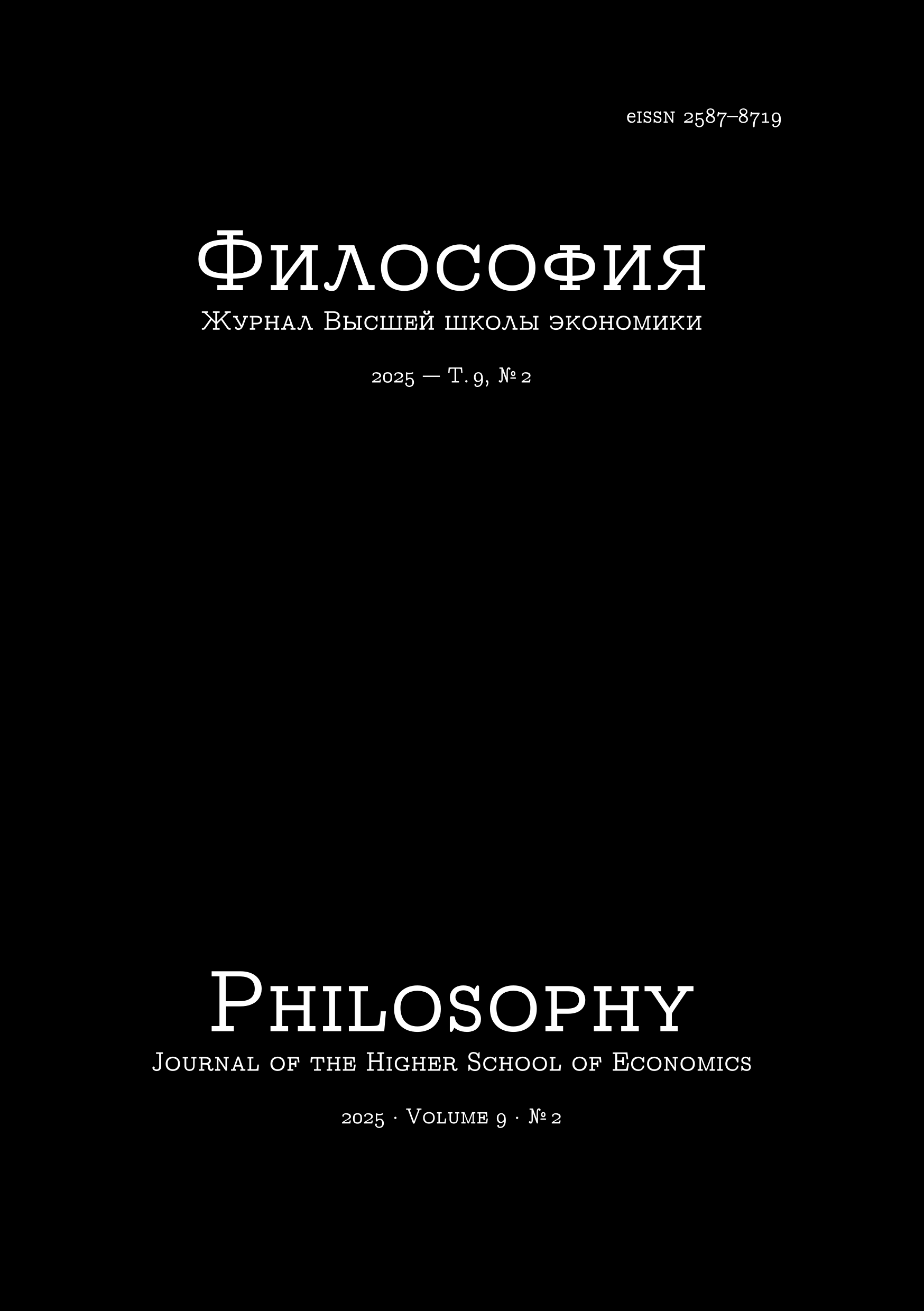Philosophy. Journal of the Higher School of Economics. Vol. 9 No 2
Abstract
Dear colleagues!
We are pleased to present the 2nd issue of the 9th volume of “Philosophy. The Journal of the Higher School of Economics”.
This issue is dedicated to various aspects of practical philosophy — a field of philosophical inquiry that, for various reasons, has become one of the journal’s central focuses. All the contributions in the three main sections engage with political and legal philosophy: “History of Political Thought”, “Political Philosophy of Slavophilism”, and “Problems in the Philosophy of Law”.
The first section, “History of Political Thought”, features two studies. Olga Togoeva examines Jean Petit’s treatise “Justification of the Duke of Burgundy” (1408), a seminal source that first formulated the theory of crimen laesae majestatis. Anna Seregina analyzes English political pamphlets from the second half of the 16th century, focusing on the concepts and metaphors borrowed from classical republican tradition. The author highlights how pamphleteers discussed female rule and the objectives they pursued.
The “Political Philosophy of Slavophilism” section comprises four contributions. Arseniy Romanenko seeks to explicate the concept of “People” in Slavophile texts from the 1840s–1880s. Aleksandr Kotov explores the reception of Slavophilism in the political and literary newspaper “Novoye Vremya” during the 1880s. Andrey Teslya examines Vasily Zenkovsky’s portrayal of the Slavophiles in his historical-philosophical works. Larisa Arzhakova compares two Polish scholars’ interpretations of Slavophile teachings — Marian Zdziechowski (1861–1938) and Andrzej Walicki (1930–2020).
The “Problems in the Philosophy of Law” section includes five articles. Arseny Kraevsky investigates the concept of public authority — including its social dimensions — in legal philosophy. Anton Mikhailov discusses the significance, structure, and methodological foundations of legal dogmatics in the continental legal tradition, with particular attention to how philosophical worldviews influenced the development of public law dogmatics. Dmitry Poldnikov traces the doctrinal origins and key milestones in the long process of recognizing legal entities as subjects of law across global legal systems. Nikolai Kuznetsov explores how madhhab (legal schools) emerged as one of the most important institutions and concepts in Islamic law. Vladimir Bashkov examines the extra-legal foundations of Hans Kelsen’s philosophy of law.
In our traditional “Archive of Philosophical Thought” section, Ivan Lupandin and Grigoriy Konson have translated and annotated (also authoring the preface) an excerpt from “Dagger of Faith” by the Catalan philosopher and theologian Ramon Martí (Raymundus Martinus). The “Philosophical Criticism” section features four reviews: Fyodor Gayda reflects on Konstantin Dushenko’s book on Russophobia (2024); Artem Bychkov reviews the collection “Diseases of the Head: Essays on the Horrors of Speculative Philosophy” (ed. Matt Rosen, 2020); Konstantin Mal'tsev evaluates the second volume (of two published — a third one is expected this year) of Sergey Nikolsky’s work on the Soviet era (2023). Additionally, my own review is included, covering a 2025 book on James Cameron’s “Aliens” from the “Constellations” series on science fiction cinema.
In Memoriam. This year, the Faculty of Philosophy of Lomonosov Moscow State University suffered irreparable losses. Several brilliant scholars and teachers passed away: in May, our journal’s contributor Elena Kosilova, and in June, Karen Momdzhyan, Head of the Department of Social Philosophy and Philosophy of History, and Mikhail Maslin, Head of the Department of the History of Russian Philosophy. Tributes were written by those close to them: Zinaida Sokuler for Elena Kosilova, Aleksandr Antonovsky for Karen Momdzhyan, and Boris Mezhuyev for Mikhail Maslin.
The editorial board of “Philosophy. The Journal of the Higher School of Economics” and the faculty of the School of Philosophy and Cultural Studies at the HSE University mourn their passing and extend deepest condolences to the families, friends, and colleagues of Elena Vladimirovna, Karen Khachikovich, and Mikhail Alexandrovich.
Alexander Pavlov
Downloads

Copyright (c) 2025 Philosophy Journal of the Higher School of Economics

This work is licensed under a Creative Commons Attribution-NonCommercial 4.0 International License.





